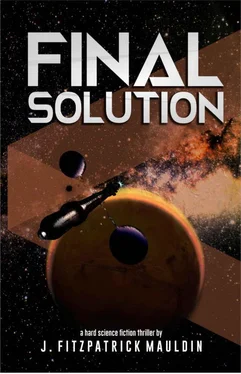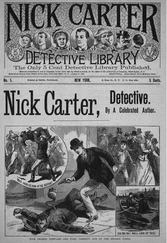“Ahh, I see.” He scowled and left the room, rolling his eyes and twirling his stun stick like a constable on his beat. “Stick with the safe bets, not the long odds. Better luck next time.” He tapped the hatch with the end of his stick, metal ringing, while whistling the melody to You Are My Sunshine as he crossed the threshold.
I thought back through what had just happened, running fingers through my hair. What the hell was that about?
“César,” I called into my watch, wrist facing up. “Everything alright?” I glanced towards the hall, hoping Dour Face was gone.
“Si, señor. Just a power trip. Nothing unusual, right? The manual said it was normal. I checked before I gave the bridge the okay.”
“It is normal. The rail gun’s magnetic field can trip the power.” I just wished someone had told me first. “Did it make you feel sick when it went off? Some people have a biological reaction. Your first, yeah?”
“Si, it did, I’m cleaning up what’s left of my lunch right now. Didn’t think you’d appreciate breakfast being all over the floor.”
My nose screwed up at the vicarious sensation his tone communicated. “I wouldn’t.”
This was one department where I was lucky, and hot damn, was I lucky.
The only ship to ship weapon the Vindicator possessed was a rail gun, and despite only being able to fire one at a time, we were armed with two. One was mounted on top of the ship, relatively speaking, while the other was underneath; however, both were attached to a rotating band which could counteract the habitat’s gravitational spin. Imagine a Coke can with a ring around its middle that spins to the left while the can spins to the right. On opposite ends of the ring our guns are mounted, which in a relative sense remains fixed while being used. They focused on one point in space as to take aim and fire, then lock in place when they’re done to spin along with the rest of the hab.
After setting sites, the rail guns then hurl an eighteen-kilogram projectile through the vacuum of space at a velocity of eighty thousand five hundred kilometers per second by creating a series of opposing magnetic fields down the length of an extendable armature. They’re pretty impressive, actually. Cheap ammo and deadly kinetic energy. The only trouble was that they required vast amounts of electricity. The ninety-eight nanosecond firing cycle consumed nearly as much power as a large nuclear plant each time we pulled the trigger, not something the photovoltaics could handle. And so, the good boys back on Earth, with their high science and newly discovered isotope, Degrassium , had created for this purpose what they called a “Two Stage Nuclear Battery”—of which we now had ninety-nine remaining.
Do you feel lucky, punk? Well, do ya?
The term battery , however, was loosely used in this context. They were rather a collection of portable, radioisotope thermoelectric generators (RTG), much like the ones used in early deep space probes—but with one exception. These had state of the art graphene super capacitors capable of trapping vast amounts of electrical energy over time without melting from heat exchange. When we used a battery to fire our rail guns, we merely allowed a capacitor to blow out, releasing its energy in a controlled manner down the length of the weapon’s rails. It was a dangerous procedure, and thus the batteries were stored along a 120’ halo connected to the hab by two slender trusses.
Aside from this danger, it had an unfortunate design issue that was inescapable. Every time you fired the rail guns it created a massive electromagnetic field along the weapon’s arm. With each shot you run a small risk that the magnetic field would fry every system on board, erasing the central computer core entirely. To protect from this crippling fate, all data was backed up to chemical hard drives before firing. If the ship’s breaker did indeed flip, we’d just turned it back on. But as I said before, I was lucky. Unlike some crewmembers who got violently sick from these EMFs, like César, they didn’t bother me. Though I do have to say, being plunged into darkness during a BM certainly did.
I checked the earpiece Liberty gifted me in hope of a report. Nothing. Not even static. Ever since the first attack she’d left it off. I guess that’s how people gave you the cold shoulder in the 21st century, by amputating your digital connections.
Liberty had become as slippery as an eel. A couple of weeks had passed since the first attack, and I’d not seen her even once. Not the back of her head out in the hallway, not the arm of her uniform’s jacket passing onto the bridge, not even her glowing face through the windows. That place was closed off entirely. I’d gone a little overboard with my PT as a result of searching for her. I was up to eighteen miles a day versus twelve with two hundred lbs. of extra weight. It didn’t make me any bigger of a guy, just leaned up the little muscle I had.
No matter how many times I lapped the bridge, there was a nagging sensation that didn’t go away. Someone I wanted to see was inside the velvet rope of an exclusive club, dancing, throwing back drinks and chatting it up with fashionable people, while I was on the outside looking in along with the rabble. Dramatic description, perhaps, but I didn’t care.
I strolled back to the Power Core and found César chatting with a pair of new faces. They were making light of the fact all three had gotten sick during their first firing solution. This would be some serious scuttlebutt over the next couple weeks.
César was bent over, laughing hard, and for once, his smile wasn’t brittle. The company of his new friends was doing him well.
From the look of the pair, their matter-of-fact speech and casual postures, I guessed that they were from Valles Rojo just like him, even though it was clear neither were Latino.
“Ever look at this ship from the outside?” a husky man with dark hair asked. “So simply built.”
“For real,” César said, “who designed this ship, esse? It’s like a lightsaber and a sex toy got together to have a baby.”
The girl on their left shook her head. “Hooray, we’re riding a phallic fencer, an interplanetary prick.”
They quieted at my arrival and lowered their heads. I guess they didn’t think I could handle a few off color jokes.
“At ease, at ease,” I said, waving a hand.
“Just cleaning up the mess, señor,” César announced, stuffing a handful of messy wipes into a garbage sack. “Have you met Maintenance Privates Jane Griffin, and Robert Kelly?”
I shook my head and extended a hand. “Might be a small ship, but I’ve not had the pleasure.” My hand was taken up by a cute, pale skinned girl with a pinched, foxlike face covered in freckles. Her hair was blonde, pixie cut, and she had green eyes, a strange combination to be sure, but one that complimented her perky attitude and gamine features well.
“Master Engineer Goddard, I’ve heard great things about you,” she said, her fingers snaking around my hand in a casual caress. The bones of my fingers ached for an instant as she squeezed. “Heard something about you being a skimmer racer back on the flats. You were quite the driver.”
“Don’t believe all the hype. Lies.” I fought a smile.
She chuckled and raised her shoulders, but when I tried to pull my hand away there was hesitation. Her eyes locked with mine, and I felt a shock of excitement. This girl wasn’t cold like Liberty had become; she was young and vivacious, yet naive and gullible. The gasket memento on my right ring finger felt strangely uncomfortable beneath her grip. I gave a slight jerk to free myself. My palm ached.
“Oh, I’m sorry,” she said, pushing a few loose strands of hair behind her right ear. “I get nervous sometimes meeting new people. I get stuck a little, like, I don’t know what to do next.”
Читать дальше












